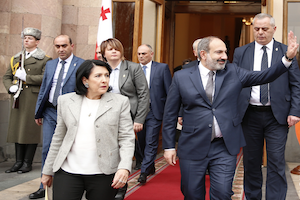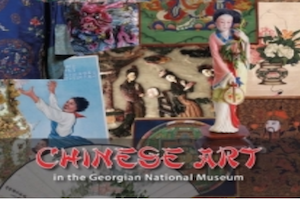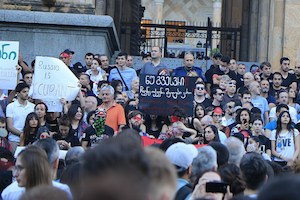Emerging Room for Rapport Between Sokhumi Tbilisi
By Emil Avdaliani
June 18, 2020, the CACI Analyst
Georgia’s breakaway region of Abkhazia is undergoing a deep political crisis coupled with troubles in its relationship with Russia. This potentially opens for a rapprochement with the government in Tbilisi and Abkhaz politicians have already come out with some bold statements. Although Abkhazia’s continual dependence on Russian financial and military support will keep the region under the Kremlin’s control, the emerging trends also suggest that tensions between Russia and Abkhazia will continue and grow.

Armenia Seeks Re-Energized Ties with Georgia
By Natalia Konarzewska
April 15, 2020, the CACI Analyst
Armenia’s Prime Minister Nikol Pashinyan visited Georgia on March 3-4 to discuss bilateral relations and held several high-profile meetings with top politicians including his Georgian counterpart Giorgi Gakharia and president Salome Zurabishvili. This is Pashinyan’s third visit to Georgia since he assumed office in 2018, following a peaceful power shift ousting the previous unpopular regime. His government has made a broader effort to reinvigorate ties with Georgia. Despite fundamentally different geopolitical outlooks and various challenges, Tbilisi and Yerevan have maintained good neighborly relations based on political pragmatism. Yet their partnership still has room for improvement.

Geopolitics Doomed Georgia's Anaklia Project, But Can Also Resurrect It
By Emil Avdaliani
March 9, 2020, the CACI Analyst
Georgia’s long-awaited Anaklia project officially ended in January 2020. The country’s internal problems as well as geopolitical competition involving the U.S., China, and Russia doomed the deep-sea port. However, this same geopolitical competition could serve to keep U.S. interests in the project afloat, as Chinese and Russian investments in the port would be problematic for Washington. Moreover, after Georgia’s critical parliamentary elections this year, Tbilisi may become better positioned to support a new concept for constructing Anaklia.

China's Soft Power in the South Caucasus
By Nurlan Aliyev
March 2, 2020, the CACI Analyst
In December 26, 2019 , the Georgian National Museum presented a new exhibition titled “Chinese Art in the Georgian National Museum,” dedicated to the 70th anniversary of the People’s Republic of China, and a book on the theme by Georgian authors. Within this project, supported by the Embassy of the People’s Republic of China in Georgia, several exhibitions of works by Chinese painters take place in Tbilisi between December 2019 and February 2020. In recent years China’s growing economic presence in the South Caucasus has been accompanied by developments in cultural and educational relations between China and the regional states.

New Wave of Anti-Government Protests in Georgia
By Natalia Konarzewska
December 16, 2019, the CACI Analyst
Before the dust from the June anti-government demonstrations had time to settle, Georgia saw a new round of protests in November. This time, Georgians took the streets after the ruling Georgian Dream (GD) party declined to reform the electoral system despite earlier promises. A majority of Georgians support switching from a mixed to a fully proportional electoral system before the 2020 parliamentary elections, since this will break the ruling party’s electoral domination and ensure a fairer parliamentary representation for small parties. GD proposed electoral reform in June to meet opposition demands, however, in November the ruling party surprisingly backed away from the idea after failing to collect the essential number of votes among its deputies to pass the constitutional amendment.



